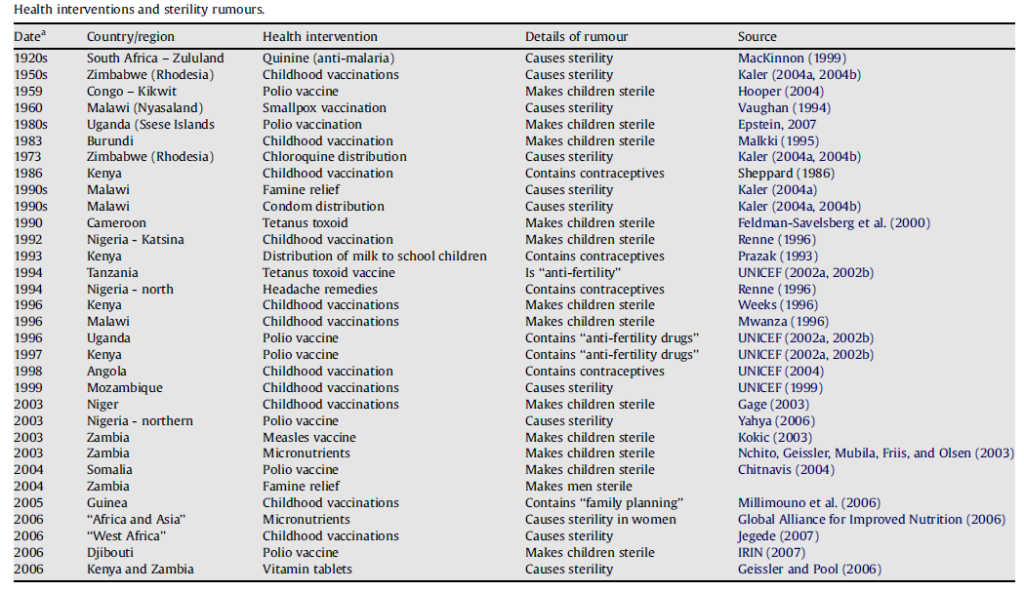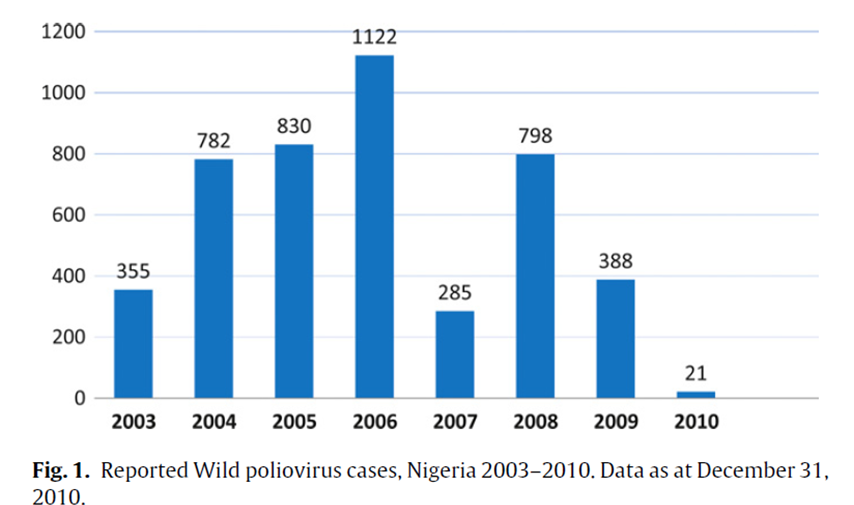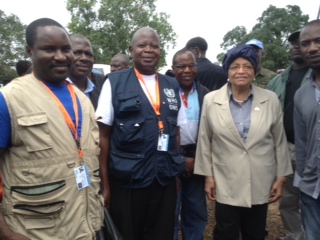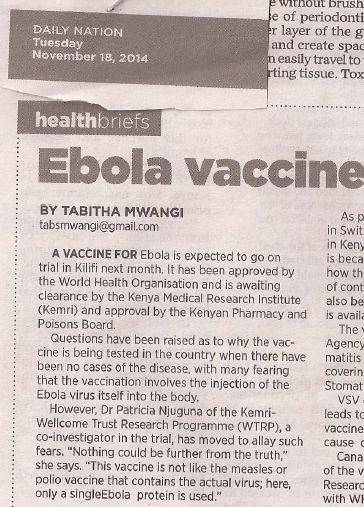
On vaccines and fertility
Those as young as I am have lived through a few of these ‘vaccines will make you sterile’ stories. I have often wondered where they start, but they kinda in Kenya tend to burst forth in the altar of one church or the other.
I can just picture the beginnings of the just ended tetanus vaccine rumour, somewhere, anywhere, the conversation starts (forgive the street lingua)….
‘Have you heard? The tetanus vaccine is being given to girls as young as 14,’
‘Kwa nini? Si I thought that vaccine was for pregnant women? Me, I got one when I was page’
‘Hmmm si that is how they start, pregnant women and now little girls, why are teenagers getting something meant for pregnant women?’
‘Hawa hawataki tuzaane’
‘I swear!’
‘Tena not everybody is getting it, did you know?’
‘Eish, najua watu wao hawapati’
‘I swear!’
Before you know it, even the cardinal of the catholic church is caught up with the story.
http://www.nation.co.ke/counties/Njue-opposes–tetanus-drive-by-ministry/-/1107872/2256584/-/8wo8kvz/-/index.html
Now when the local gossip is repeated by none other than the cardinal of a church – a man that has been known in the past to fight big fights for the truth – then doubts begin to settle in people’s minds.
‘If the cardinal thinks there is something wrong, perhaps, he knows something we don’t.’
And before long, the vaccine program can collapse. Luckily for Kenya, the rumour that tetanus vaccination is some form of a sterilization program, did not topple the campaign.
But this lack of trust in vaccine programs is not unique to Kenya. Vaccine confidence is dwindling worldwide. So serious is the problem perceived to be that there is now a program known as ‘The Vaccine Confidence Project – monitoring public confidence in immunisation program’ at the London School of Hygiene and Tropical Medicine.
http://www.vaccineconfidence.org/
However, linking vaccinations to sterilization has a long history.
Amy Kale of Department of Sociology in University of Alberta, published an article in the Social Science and Medicine journal in 2009 on this topic. The paper is titled ‘Health interventions and the persistence of rumour: the circulation of sterility stories in African public health campaigns’
She starts her paper by saying ‘The biggest file in my office is labelled ‘rumours about sterility’.
She provides a full table of rumours and their related outcomes and I paste it here so we know that this particular one is just a drop in the ocean of many such rumours. Kenya features a few times. Some of you as young as I am will remember some of those rumours – those who drunk ‘maziwa ya nyayo’ remember the stories that the milk was laced with contraceptives.
Amy suggests that these rumours should not be laughed off because ……
‘Despite increasing up take of vaccination and other health interventions, rumours about sterility continue to pop up with a frequency and regularity which suggests that they are not merely isolated occurrences, but express some underlying commonalities’
She quotes from rumours with serious consequences: the Kano (Northern Nigeria)polio immunization campaign that was grinded in to a halt in 2003 by rumours that it was designed to sterilize Muslims. So bad were things that the government agreed to source polio vaccines only from Muslim countries. But by then, polio had caused serious devastation. Look at the graph below where wild type polio rose from 355 cases to peak at over 1,000 cases in 2006. Imagine all these children paralysed because of a rumour taken too far.
Amy suggests that the persistence of these rumours is predictable and almost inevitable.
She poses the question ‘If rumours about sterility do not tell the factual truth –if tetanus toxoid has not really been spiked with long-acting contraceptives – what kind of truth do they tell?’
She quotes Turner, a social scientist who spend time studying rumours among black Americans at a time when they were extremely marginalized, ‘Rumours are not just products of miscommunication or lack of information. Even when ‘‘accurate’’ information is provided, the rumours will continue, because they express a social reality which no amount of alternative information can change,’
Even the most superficially bizarre rumours can be credible if they can explain conjunctions between day-to-day experiences and larger historical processes in which the people who disseminate the rumours are involved.
Amy argues that rumours on sterility emerge at a convergence of socio-political forces characterized by
- Asymmetries of power in which one collectively understands itself as subordinated to the interests of another (geopolitical power)
- Perceived ongoing and historical threats to the collective survival of a particular group
- Exercise of biopolitics in the form of projects to improve collective health
- Reproductive bodies as targets and means of these projects
The relationship between Africa and Europe has often been unkind or patronizing. Almost all of Africa imports vaccines, aided in the past by UNICEF and now by GAVI – all these organizations are ‘European’ – funded by white people. ‘European’ money in family planning programs in Africa has been huge. All these breeds the notion that Europeans are keen to control African populations. The history of America, Australia and the stories of sterilization research in South Africa, all add to the ill-feelings.
That is at the global level.
On the local level, the same applies. All the boxes that Amy mentioned are ticked in the just ended tetanus vaccination campaigns. Let’s start with the places where the tetatus campaigns were focused: Kilifi, Mombasa, Meru, Marsabit, Mandera, Wajir, Garissa, Trans Nzoia, Baringo, Uasin Gishu, West Pokot, Turkana, Samburu, Kajiado and Narok counties.
Some of these areas perceive themselves to be greatly marginalised. I visited Turkana and Garissa when I did some work with AMREF and KETRI and both times, they asked me ‘how is down Kenya?’ They are so forgotten in their own eyes, that we are not part of them. I can imagine them looking at these aggressive vaccine programs and thinking ‘Medicines are hard to come by, so how come suddenly, there are all these resources to inject our teenage girls?’The fact that the vaccine is targeted on women of reproductive age raises a lot of eyebrows in these communities.
The interesting thing is that vaccination rumours are rarely present when it comes to the normal Expanded Program for Immunizations (EPI) vaccines but they surface when campaigns are launched. Campaigns tend to be aggressive with health workers having targets set for them = they are under pressure to achieve complete saturation of target populations within a span of a few days or weeks.
During campaigns, there is a lot of money mobilised to get health workers to give a service for free and in places where no other health services are well covered. The teams giving out the vaccines are also the same ones involved with Family planning programs- they are difficult to separate.
Amy concludes by saying ‘the official response to sterility rumours from the agencies which are most concerned with them is that these rumours represent misunderstandings and can be dealt with best by the provision of accurate information. The main assumption is that the provision of full and consistent information will lead to accurate knowledge and a true understanding of the purpose of health intervention which will in turn lead to rational actions such as disregarding rumours and complying to health intervention.’
Giving good knowledge goes some distance – but does not address the question of whether the rumours are credible. Credibility of rumours is determined by the convergence of social and political forces outside the control of the health program. Public health programs need to take on board the credibility of these rumours and work with that world view. She gives the example of Nigeria Kano region where in the end, to save the vaccination program, vaccines were procured from Muslim nations.
Amy concludes by saying that rumours linking not just vaccines, but any public health program to sterility are here to stay – unless wealth and power re-distribution happened globally. Health programs will however do well not to ignore the worries these vaccines are raising and work with the communities instead of laughing it off.
I feel, African countries need to start manufacturing their own vaccines. It’s a shame to be importing relatively simple to make vaccines due to fear of investing in this area. Had we been ready with labs preparing our vaccines, we may have been at the forefront of the Ebola vaccine production – instead we are sitting back and letting others develop it for us, and then we feel this something and then start rumours…..






